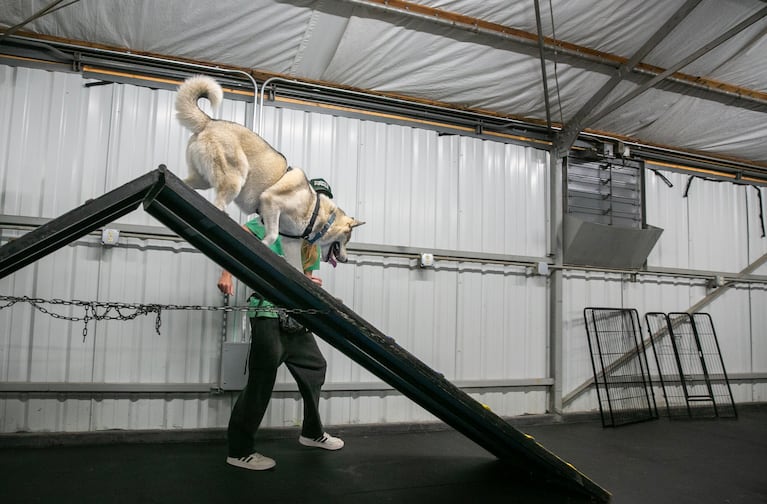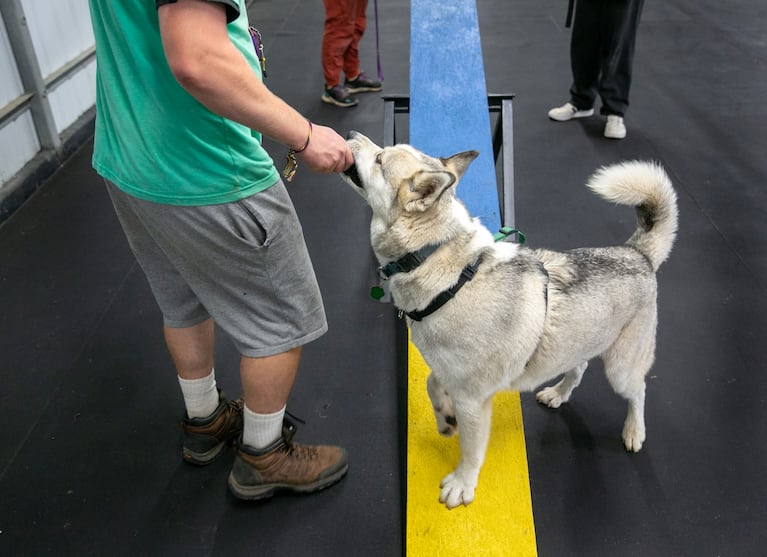
Guided by Andrew, Siberian husky Klondike successfully goes over an A-frame in the Project POOCH training center at MacLaren Youth Correctional Facility, Woodburn, Ore., Aug. 20, 2024. The training center is filled with toys and agility equipment to help the dogs — and their trainers — gain confidence.
Anna Lueck / OPB
On a warm day in August, a group of young men ran around an indoor training center in Woodburn, laughing and cheering as they encouraged a roughly 4-year-old Siberian Husky named Klondike to chart the agility course. They were focused, taking turns to instruct the dog and reward good behaviors with treats.
Klondike’s been housed at the nonprofit Project POOCH dog shelter for almost a year, waiting to be adopted. When he first showed up at the kennel inside MacLaren Youth Correctional Facility, he wasn’t the same fun, well-behaved dog he is today.
“You couldn’t get near him without him jumping on you and nipping you. He didn’t have any impulse control,” said Chris, one of the incarcerated young people who’s helped train Klondike over the past several months. “Oh my god, he pulls like a freight train.”
Because the youth at MacLaren are juvenile offenders, OPB is only using their first names.
“He’s come a really long way,” Chris said. “And it’s amazing. Knowing that you … take a part in a really big change for him, or for any animal, makes you feel nice.”
Project POOCH’s mission is to teach incarcerated youth responsibility, patience and compassion for all life. The young people learn to train and care for the dogs, as well as how to manage a kennel, while helping the pups find homes out in the community.
In the more than 30 years since its founding, hundreds of young people and dogs have been involved.

Siberian husky Klondike considers a treat, placed by the Project POOCH trainers to encourage him to climb over an A-frame at the Project Pooch training center at MacLaren on Aug. 20, 2024.
Anna Lueck / OPB
But if you ask anyone involved in “Pooch,” for short, they’ll tell you — it isn’t a dog program. It’s a youth development program that just happens to help dogs, too.
“I like to say that we offer life-changing opportunities for the youth and the dogs,” said Executive Director Sarah Bradham. “And they get to change together, which is super exciting to watch.”
Inside the POOCH kennel
Bradham oversees the nine young people currently working on the program’s roster, along with the seven or so dogs at the shelter.
The shelter typically only has four or five dogs at a time. But, like animal shelters across the country, Project POOCH has been inundated.
Part of that is because adoption rates are down, but the program has also had to respond to unexpected needs. Bradham said they had a dog recently returned from owners who were too sick to continue caring for them; another was abandoned at their office.
“We’re always going to step up and support dogs that we adopted out,” she said. “But we are, like everybody else, a little bit overloaded right now.”
Project POOCH brings in dogs from local shelters when the animals can benefit from a smaller environment. These dogs are often shut down or need structured training. The program also offers to groom and board any dogs who were adopted out through their program, as well as provide daycare for pets of MacLaren staff members.

Project POOCH Executive Director Sarah Bradham stands in the organization's office at MacLaren Youth Correctional Facility, Woodburn, Ore., Aug. 20, 2024.
Anna Lueck / OPB
Most of the youth working there are between 18 and 21. They’re paid for part-time or full-time roles. And they have to meet set criteria to apply, including not having any recent incidents at the facility and no prior issues with animal abuse.
Participants work with the dogs daily. Their days are filled with cleaning, walking, training and charting, and they have the opportunity to test for a handful of nationally and internationally recognized certifications.
Cesar, another of the participating young people, said he especially loves improving the dogs’ confidence over time. The young employee said the program has taught him a lot, and he cares more now about giving back to his community. But his proudest moments are seeing a dog blossom and showing that off when an adopter comes in.
“I’m like, ‘Yo, that’s my dude!’ ” Cesar said.
Andrew has been working with Project POOCH since last December. Bradham said Andrew is often the first to visit the dogs every day, going from kennel to kennel to greet them. She said he has a bit of a superpower — he’s good at sitting with the dogs, staying quiet and calm, and enforcing the shelter’s “fear-free” guiding principles.
“I love it,” Andrew told OPB. “It is the best work site I’ve ever worked at.”

Vivienne, a 1-year-old heeler, looks nervously through the fence of her enclosure at MacLaren Youth Correctional Facility, while Project POOCH trainer Chris works to redirect her attention, Aug. 20, 2024. Project POOCH serves shelter dogs who would benefit from a calmer environment and personalized training to gain confidence, overcome behavioral issues, and increase their chances of fitting into an adoptive family.
Anna Lueck / OPB
When Clifford, an 11-month-old mix of several breeds, came into the shelter, Andrew said the puppy was so scared that he’d pee and defecate in the kennel and hide in a corner.
“I sat in his enclosure with him for two hours,” he said. “I just sat there, you know, and I threw him treats, and I didn’t look at him. I didn’t put any social pressure on him. It was all in the pursuit of setting those boundaries and meeting his needs…. Body language is very important.”
Andrew grew up with a black Labrador Retriever. He said working with POOCH lets him relive those happy memories. But he said it also teaches him important “adulting” skills.
The work teaches participating youth a lot about communication, too. They have to communicate with each other throughout their shifts: Which dogs have been fed and walked? Which ones are struggling emotionally that day? What do they need to calm down?
To do this work effectively, the workers have to leave any personal baggage from the day at the door.

Project POOCH youth trainer Cesar explains the training board, which tracks each dog's progress on various behaviors like obeying commands and lowering reactivity to stimuli like loud sounds or being touched, MacLaren Youth Correctional Facility, Woodburn, Ore., Aug. 20, 2024. Project POOCH serves shelter dogs who would benefit from personalized training to increase their chances of fitting into an adoptive family.
Anna Lueck / OPB
Troy Britting, a program director at MacLaren, said Project POOCH is more impactful than any others they have at teaching the youth empathy since they’re directly caring for other creatures.
“People are super surprised that something like this is housed in a correctional facility,” Britting said. But, he went on, “it encompasses all that we do here in a super impactful and positive way.”
Youth training dogs, dogs training youth
These experiences teach participants skills and life lessons they can use when released.
“Not only are we helping them change their thinking of the way they interact with animals while they’re here, when they leave here,” Bradham said, “we’re putting animal advocates into the community.”
Bradham said the youth are learning to care for and challenge themselves along the way. This, she added, is especially important for incarcerated youth — whose brains are still developing.
“These guys are going to rejoin our community,” she said. “They will get out. So, we can choose to invest in them and invest in their development and set them on the right path, or we can be punitive.”

Rosie, a 7.5-year-old Yorkie mix, in the arms of Project POOCH Executive Director Sarah Bradham at MacClaren Youth Correctional Facility, Woodburn, Ore., Aug. 20, 2024.
Anna Lueck / OPB
Edgar Cortez, a “group life coordinator” at MacLaren, added that the guys at MacLaren have “never had a chance to prove themselves.” With Project POOCH, they take on tasks they’ve never done before.
“They never had … that push to grow,” Cortez said. “And I think that’s what we’re doing here.”
That’s been a key takeaway for youth like Lakota.
“Yes, you’re training the dog, but the dog’s also training you,” said Lakota, who’s earned three animal training certificates in his time there.
“I learned that nobody’s true self is bad,” he said. “We’re all good on the inside, and working with dogs just shows that our true, core self is good.”

Project POOCH youth trainer Andrew places a hand on Leah, one of the boarding clients at the nonprofit kennel housed at MacLaren Youth Correctional Facility in Woodburn, Ore., Aug. 20, 2024. In addition to housing dogs waiting for adoption, the Project POOCH kennels also offer daycare to past POOCH pups and boarding for staff to give the youth opportunities to interact with more dogs.
Anna Lueck / OPB


















